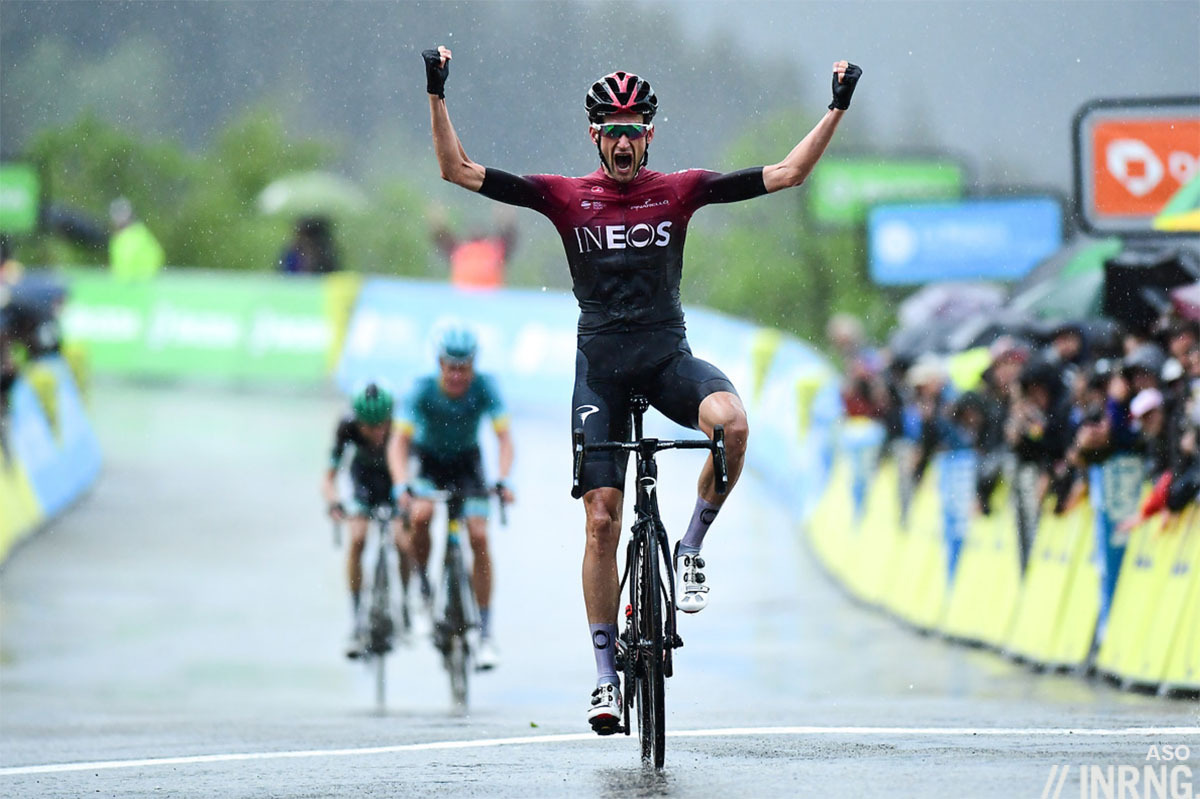
Wout Poels has punched ahead for the stage win but behind Jacob Fuglsand and Emanuel Buchmann are ahead of the rest of the contenders. The photo tells us plenty about the week with the wet weather visible and an Ineos worker unleashed.
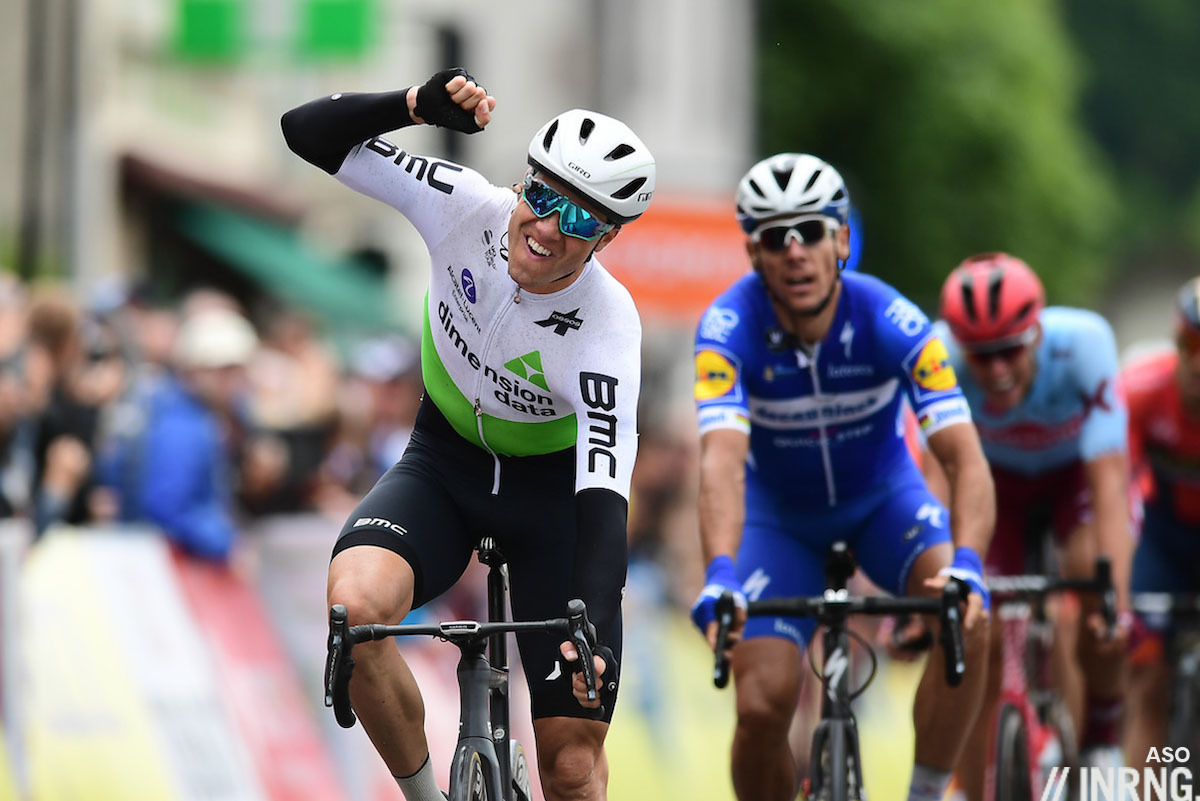
Stage 1 saw Edvald Boasson Hagen win and Dimension Data resurgent, although only briefly as they’d finish the week last on the team classification, an hour adrift of the next team… yet 21st out of 22 teams because Vital Concept didn’t finish with enough riders to count and until then they’d been the last team and hardly making the case for a Tour de France wildcard any time soon.
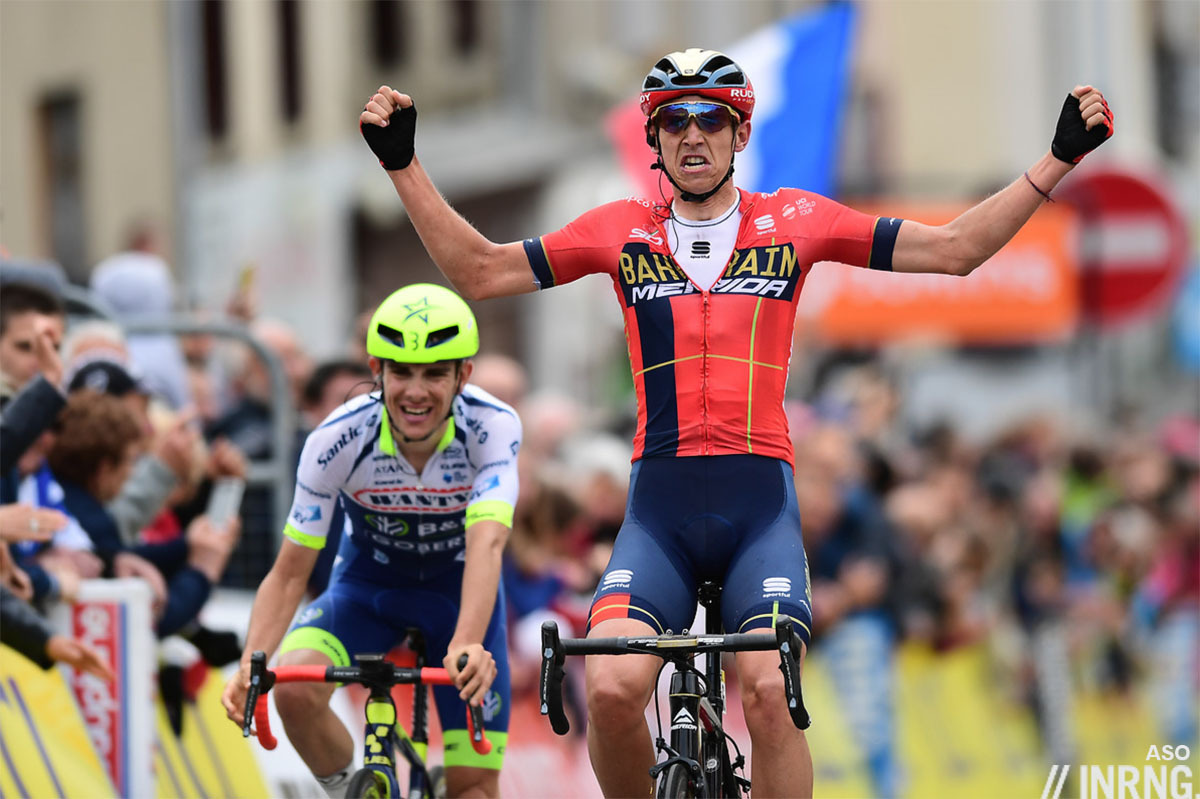
Stage 2 to Craponne showed Pro Conti teams can enliven races as Guillaume Martin narrowly lost out to Dylan Teuns – apparently named after Bob rather than Beverly Hills – won the stage. This was probably the best stage of the week, the sharp climb to Saint Victor was enough to blow the race apart thanks to an attack by Thibaut Pinot which saw a select group racing hard to the line, both hoping to contest the stage win and to hold off those behind like Dan Martin, Richie Porte, Steven Kruijswijk and Romain Bardet. It was a short climb but still informative as the same names were just off the pace for the rest of the week when in recent years they – excluding Kruijswijk – typically win stages.
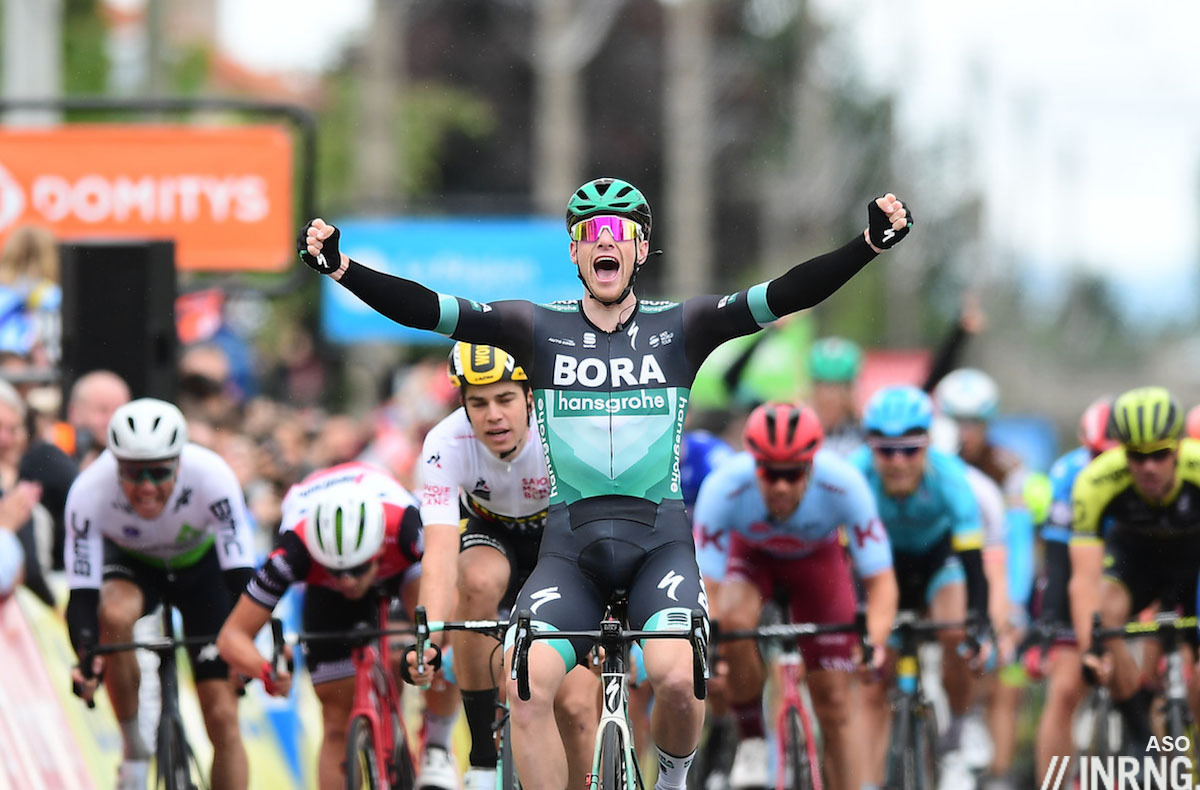
Sam Bennett got his bunch sprint to keep his win rate up, he’s got seven wins from 34 days of racing, impressive efficiency. But Julian Alaphilippe has 10 wins from 29 days and he collected a stage and the mountains jersey. But no matter what the stats are on Bennett and how much this blog might rate him, he’s still not the A-list sprinter and probably needs a Tour de France showing.
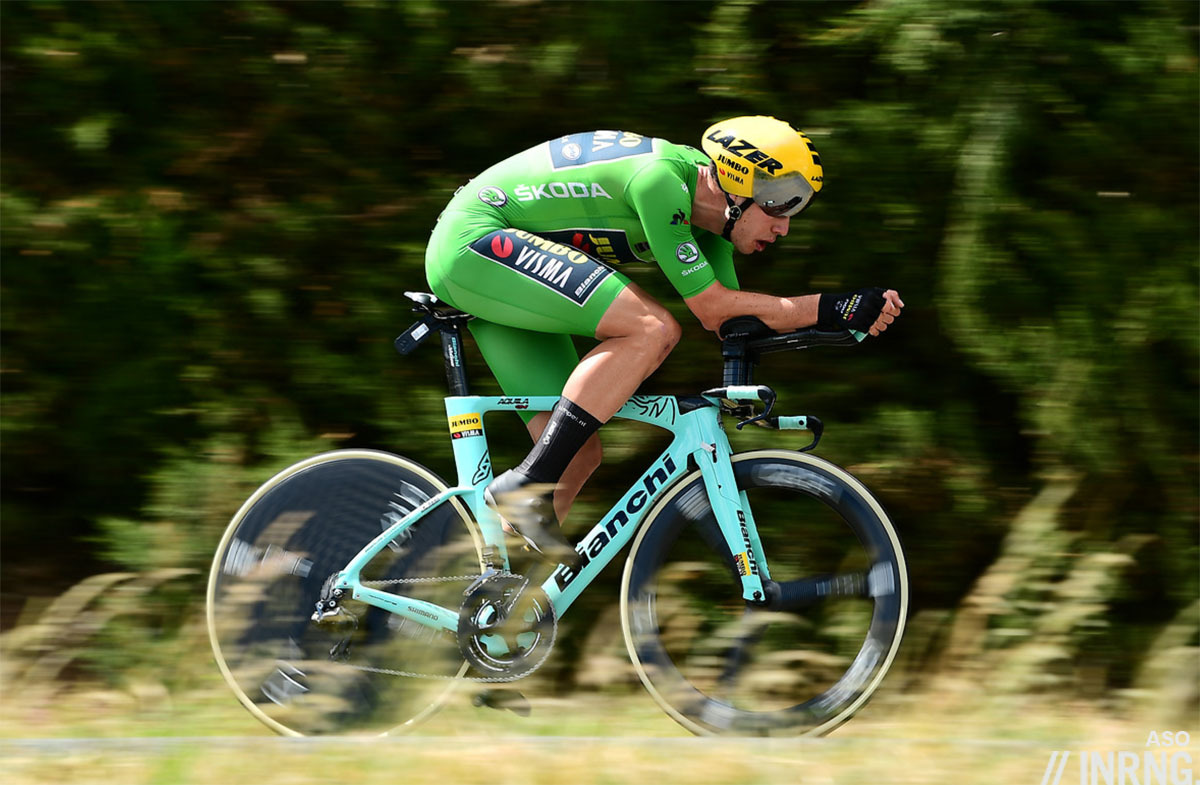
Wout van Aert’s hardly a new name these days but was a revelation in the Dauphiné as he’s been strong in time trials before but not this good and he beat the whole field and for good measure won the following day’s stage to Voiron.
The time trial was dominated by the news of Chris Froome’s crash during his morning recon ride and the dreadful injuries which will need months of rehab. It makes you think, something as banal clearing your nose mid-ride ends up in a helicopter ride, hours of surgery and months of rehab. It might also make some Ineos riders think because they’re usually working as wagons on a train but this time Wout Poels and Dylan van Baarle got to play at winning. But it’s easy to say, or type, that they could move teams and start winning but Ineos pays generously and riders can earn more than they’d get elsewhere and not be bothered by expectations of victory.
Chris Froome wasn’t the only rider to exit. Tom Dumoulin quit as well and the final stage saw many riders succumb to gastric woes including Adam Yates, one minute sitting second overall, the next DNF and sitting on the toilet. Michael Woods didn’t start the final stage thanks to the same problems, Steven Kruijswijk quit too.
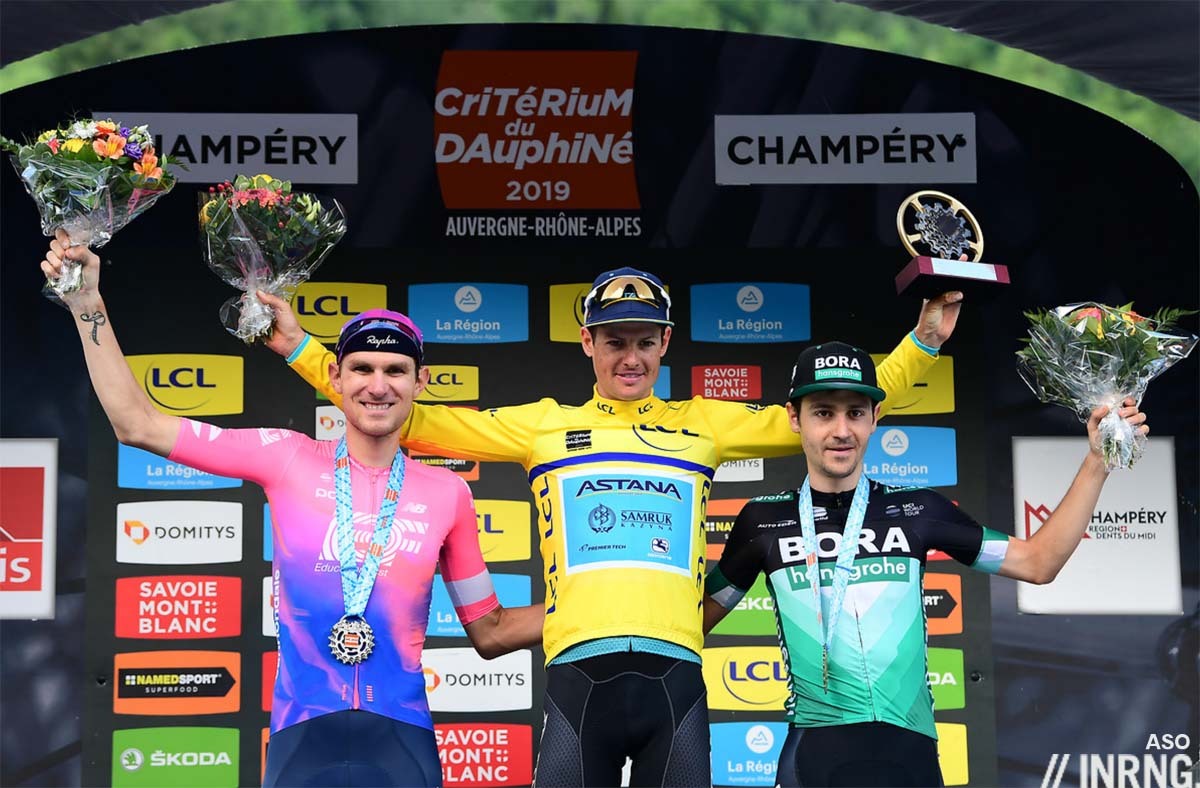
The Verdict
The Dauphiné’s often been one of the best races of the year but the 2019 vintage fell a bit flat. It had its moments but the hallmark of the race in recent years has been a frantic final weekend where the winner wasn’t known until the very end and has often been a highlight of the whole year’s racing. This time it wasn’t so, a mix of the poor weather, route and the peloton’s mood. Friday’s stage saw the GC riders huddle on the final climb, Saturday’s stage saw them grouped until the final climb despite the short distance and Fuglsang’s winning move to join Buchmann was launched the final two kilometres. Then Sunday’s stage saw the race for the yellow jersey locked down by Astana. To paraphrase Fuglsang’s own words Astana are not Ineos but they’re closing the gap.
None of this should take away from Fuglsang’s win, he made all the right moves including a ninth place in the time trial. It just meant the race didn’t have the Hitchcock suspense of previous editions. For Fuglsang this may not be as spectacular a win as 2017 when he profited from rivals marking each other to poach the lead on the final day, a dramatic win he’ll enjoy. But he’ll also find satisfaction in 2019, here he built his own win and crucially had to defend the lead.
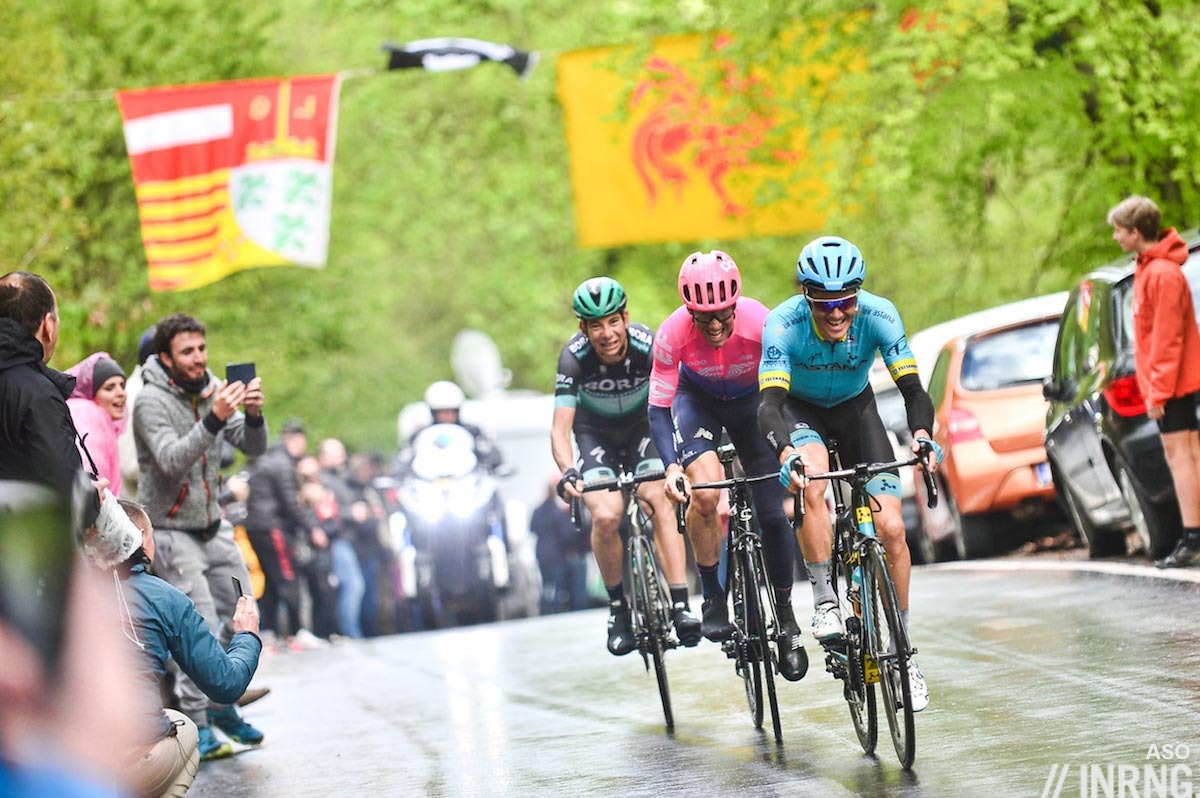
The “Fuglsang 2.0” were saw in the spring classics is back and “Fuglsang 2.1” is handling the summer stage races rather well too although we should note the weather was more like March than April for most of the week. Does this translate into a Tour de France win? Of course not but he seems to be shaping races this season, once he could follow moves, now he’s launching them and it’ll be interesting to see him and Astana translate this into something during three weeks.
Tejay van Garderen finishes second overall thanks to finishing second in the time trial. He didn’t do much else of note but that was all he needed to do because it was such a strong ride that he made up for missing the move on Stage 2 and for losing a few seconds on the Stage 7 summit finish too. Emanuel Buchmann finishes on the podium and continues his progress, he won the best young rider prize here in 2016. This year’s white jersey went to Bjorg Lambrecht.
Among the others Thibaut Pinot had a good week, he’s re-worked his time trial position and is less aero but more comfortable and as a result is losing less time. Riders like Nairo Quintana probably have more work to do as the Tour de France’s first summit finish at La Planche des Belle Filles is hurtling towards us. Romain Bardet can make an instant impression if he wins today’s Mont Ventoux Dénivelé Challenge (it’s on TV, forecast finish for 3.00pm CEST) and then it’s all eyes on the Tour de Suisse and the other Tour de France contenders…
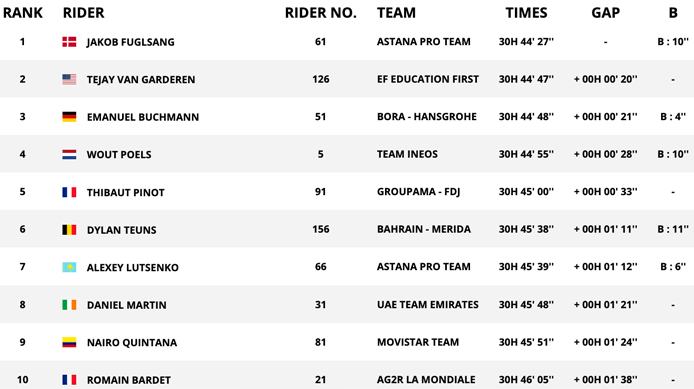

Can’t get over W. Poels’ arms.
Those aren’t arms – they’re spare handles from the broom wagon.
After Froomeys crash the race felt as gloomey as the weather, definitely took the shine out of it.
Great coverage as usual thanks
Again a race destroyed by a poor route design. I can’t understand the ASO’s obession with short mountain stages. It’s all good to throw in one from time to time but they made a habit of it. Just because one short mountain stage provided great excitement (final Dauphine stage in 2017) doesn’t mean it will happen every time. A stage like the one yesterday woulnd’t have made a difference in a junior race let alone in the WT. It didn’t even have a proper climb in it, so it was clear from the start that nobody would even try to do something. Cycling is an endurance sport and it’s about time the organizers take note because soon we will have stages less than 100 km in length.
On a different note I wonder why teams do not use water bottles with a plastic cap in bad weather conditions. Surely it could minimize the risk of stomach issues the day after.
The short stages have worked well in the Dauphiné for several years now (and Paris-Nice too), I think they should stick with it. As for the bottles, a cap could help but it’s possible spray gets everywhere, for example imagine if a herd of cows was marched up the road recently and the riders end up breathing and swallowing vaporised cow pats there’s little that can be done, or if a ditch overflows etc.
This is why I love cycling. Nowhere else would I get to read the evocative phrase ‘vaporised cow pats’…
Some bottles are worse than others as well. I like the ones where you pull it out with your teeth, as at least then the teat is partially hidden from road grime. Some bottles teats are massive and entirely exposed though, so you take a drink and it’s really gritty, you end up spitting some out.
So nothing as simple as that these riders were staying in the same hotel ?
Not this time, they were spread across different hotels. Also less of a risk these days as most teams bring their own chefs and ingredients these days.
Is it not just that they are relatively low pressure, essentially warm up/training, races and riders are more willing to take a risk? The length of the stages being fairly irrelevant.
I also think, that for short mountain stages to have any effect, they need to include a more punchy finish than uphill to Champery, which was perfect for defensive riding.
Very strange design of a short stage.
Dauphiné needs a ultrafondo mountain stage. With that, you can think of a so-called “fast and furious” one. The TT should also be longer. This is bonsai cycling. The more distance-resistant riders are heavily penalised these days.
Presenting a race for TV sometimes leads to stage designs that have compromise written on them, but without the coverage there would be no race. France Televisions only showed a brief highlights package of the final stage.
The race on Thursday took place during what has since been declared a state of emergency with huge losses for les agriculteurs and epic amounts of rain with hail. This takes it’s toll
The effect of the weather shouldn’t be under-estimated I don’t think – with the rain & accompanying cold, it can add to the physical toll and especially to mental fatigue. Not to mention increasing the chances of illness. It’s perhaps no surprise that after numerous days of rain, the racing seems a little lacklustre…we perhaps saw similar in the Giro?
Does anyone else get the feeling cycling is in a bit of a between generation lull this season? Other than Alaphilippe’s big one day wins most races have seen surprise or fairly old winners. It’s like the likes of Stybar and Fuglsang are cashing in while they can whilst Carapaz and Bettiol don’t strike as generational superstars. Even Gilbert’s win could be the last big win of a superstar. It’ll probably be short lived before the era of Alaphilippe/van Aert/van der Poel/Evenepoel/Bernal fully takes off.
That’s an interesting point, and I sort of alluded to it yesterday; the lack of a familiar script to many of the races this season and this one was the same.
The generational change would be a stark way of looking at it, probably correctly so in Valverde’s case. I’m not sure the other established stars are quite past it yet. And perhaps decline happens gradually over several seasons rather than abruptly in one?
But loss of form / injury to the lead players (Dumoulin, Sagan, Quintana, now Froome) has also played a part.
Look at this week, it was so difficult to predict stage outcomes. It just felt rather odd, like the teams weren’t quite sure where to go and quite what to do.
It’s just been an odd sort of season so far?
I don’t think its just Valverde. In the last few years a lot of big names have left the scene and not really been replaced. The likes of Cancellara, Boonen, Contador, Purito Rodriguez et al and even though they are still going Valverde, Gilbert and Cavendish have to be nearing the end, and aren’t as effective as they were. Then you have Kittel effectively leaving the sport and Froome’s era potentially being brought to a close.
I agree with you there but that’s always the nature of sport.
Boonen and Cancellera’s successor was Sagan, Froome’s are Dumoulin and Roglic (Thomas), Valverde’s is Alaphilippe etc.
The fact that these guys have been off so far has seen a newer wave come to the very fore.
I think it also appears that way because mid-career stars like Sagan, Kwiatkowski, Van Avermaet, et al are having off years.
Alaphilippe’s won 10 races out of 29 outings, according to the article. Hardly a lackluster year. Maybe you are feeling that because there is the tendency for pros to contest fewer races per year that there seems to be less wins than you would expect out of someone of Alaphillipe’s caliber? The year is half over and only 29 races seems small.
@Dave Bidwell
You’re correct about Alaphilippe. I should have book ended my point above excepting him.
Are the riders getting super lean again? After a couple of years of strong/healthy, this year they look to be back to being super lean.
Maybe a reason for the problems with the cold weather racing and illnesses.
They are as lean as they have been for the last 30 years.
I am also not enamoured with the short stages, they are good occasionally as a novelty but ASO seems to be over using them (more to come in July!). Usually the Dauphine has been a better race than the Tour de Suisse but this year the later looks likely to provide more entertaining watching. The last four days feature two summit finishes, a TT and a final “short” stage but that does feature 3 HC passes all over 2000m . The Dauphine route seems very tame in comparison.
I have thought too that there has been a generational change happening in cycling. Mathieu van der Poel in the classics, it didnt happen for Egan Bernal at the Giro but Richard Carapaz was clearly a “new” name, Remco Evenepoel won the Tour of Belgium yesterday (I know its not quite in the same league as say the Dauphine but he is only 19 years old and there was plenty of competition). There are a whole bunch of others too such as Pavel Sivakov, Tao GH and Hugh Carthy. There was a certain poignancy in seeing the old great champion being helicoptered off to hospital whist in the race a new great champion was taking the plaudits.
You could even extend the ‘new names’ to include Ciccone and Ackermann winning their jerseys.
The formula is very simple – climbs need to have a minimum gradient of 7% for proper action and if you have multiple climbs you need little if any valley between the end of the descent of the penultimate and the base of the final climb. On Thursday I was sat at work with a colleague and we both concluded nothing would really happen at the weekend. Similarly I did the same exercise with my brother at the weekend with the Tour route, which personally I find rather uninspiring.
Agreed. The mountains didn’t look like they’d make a knock out blow.
Dylan Beverley Hills ? Lost me on that one
Now Dylan from the Magic Roundabout…
(and the Porridge sketch)
The explainer is in here http://inrng.com/2019/03/paris-nice-stage-2-preview-bellegarde/ there’s a big cohort of boys named Dylan in France, Belgium and the Netherlands thanks to a US TV show (think Groenewegen, Baarle etc)
LOL. I am old enough to get this joke – and the origin. Less silly in those languages that all the Dylans with last names in Spanish where I’m from.
Do you not think that calling Wout Poels – a monument winner – an “Ineos worker” is just a little bit condescending?
It’s not meant to be, more he started the week as someone in support of Froome and because of Froome’s crash, he and van Baarle both probably got opportunities they didn’t plan to have.
To be honest I think it’s actually true. He is a domestique almost all the races he starts. Even after winning a monument or destroying everyone in the French mountains as locomotive for the Skytrain. Each time it looks likes he might get leadership there’s someone else sweeping in (Bernal, Landa, Thomas, …).
And it’s very likely he’s okay with this role, knowing that a few times each season he can race for his own chances. What’s actually a bit condescending is assuming that being a worker is a bad thing and something no one wants to be (I think most domestiques prefer it being that way).
If you go back to stage 2, Woods makes the split and EF tells TJ to stop working behind when the gap was only 10-15 seconds. Woods continues to work in front group and the gap ends up being 40+ secs. TJ lost by 21 secs. Not sure if that made sense given Woods terrible TT’ing and how important the TT would be in this race which IR pointed out in his preview. EF’s tactics are better in Classics than stage races as a general rule and it cost them the top step of the Dauphine potentially.
What happened to that guy who claimed to be Vaughters and commented here? Too bad he didn’t get your message and insight when something could have been done. Dunno why these teams spend all the money on experienced directors when they could just get their tactics and strategies here for free 🙂
Lol. That’s why there’s forums like this. Armchair – 20/20 Hindsight analysis. But I bring it up because at the time I was thinking same thing. Do you disagree? Woods’s TT’ing is what keeps him from being a serious GT contender in my view. Also, pretty sure Vaughters isn’t in the car anymore.
It’s a hypothetical question, but I think most people here would not have expected TJ to TT as well as he did, equally you’d say Woods was the better rider.
In one week races, especially the Dauphiné riders might do well in the overall because their not marked and don’t look threatening, so it’s far too soon to say TJ is doing anything more than flattering to deceive with his podium finish. If he’d have finished well in a lead group there’d be more merit to your hypothesis.
There weren’t lead groups in this Dauphiné. It was boring. But he was there with everyone else. Lost the time with Porte, Martin and Bardet on stage 2 but that was it. Would I have expected him to beat TD in a TT, no but Tom’s clearly not at full speed. But the next guys in the TT were Kruijswijk and Yates and yes I’d expect him to beat them, probably by more than he did. I’d just like TJ to do well because he’s taken a lot of crap from fans over the years.